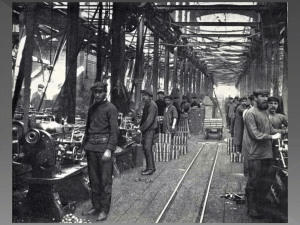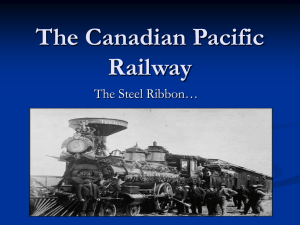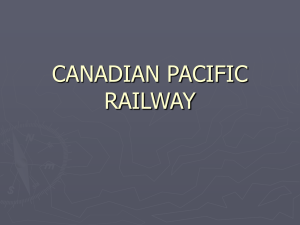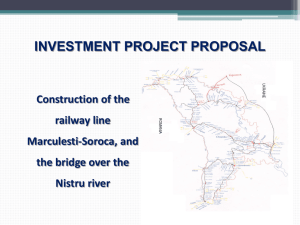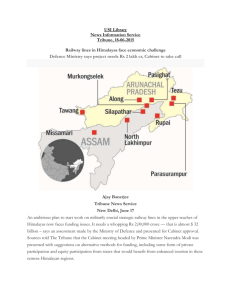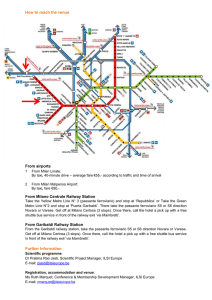Lesson 5 The Railway gets built (2)
advertisement
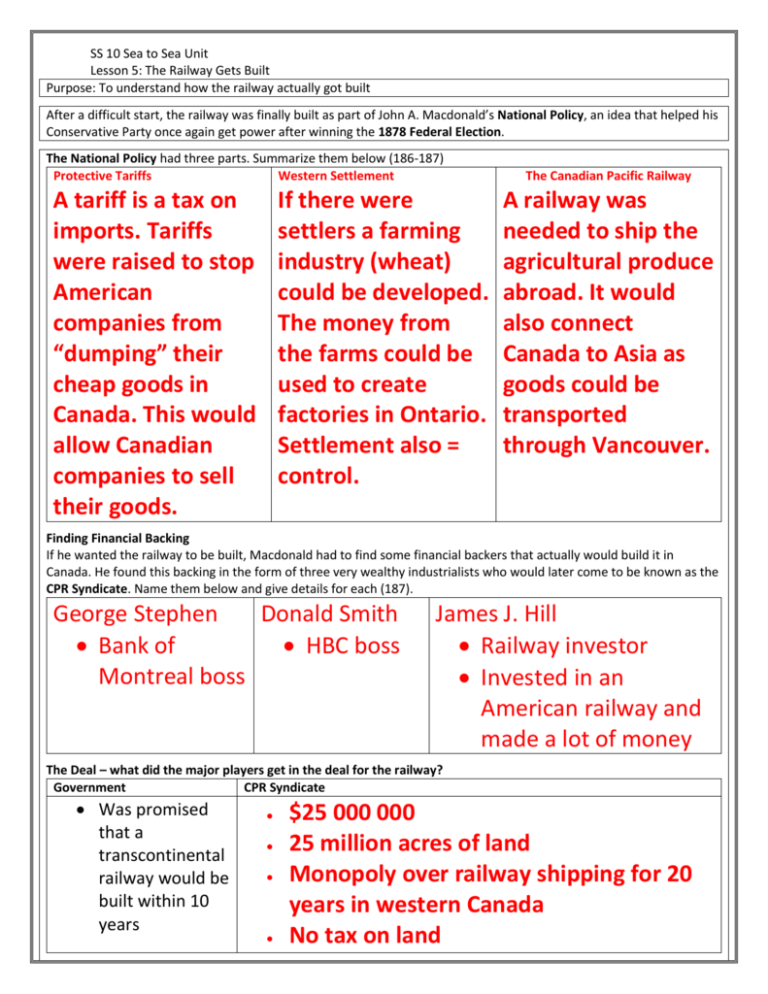
SS 10 Sea to Sea Unit Lesson 5: The Railway Gets Built Purpose: To understand how the railway actually got built After a difficult start, the railway was finally built as part of John A. Macdonald’s National Policy, an idea that helped his Conservative Party once again get power after winning the 1878 Federal Election. The National Policy had three parts. Summarize them below (186-187) Protective Tariffs Western Settlement A tariff is a tax on imports. Tariffs were raised to stop American companies from “dumping” their cheap goods in Canada. This would allow Canadian companies to sell their goods. If there were settlers a farming industry (wheat) could be developed. The money from the farms could be used to create factories in Ontario. Settlement also = control. The Canadian Pacific Railway A railway was needed to ship the agricultural produce abroad. It would also connect Canada to Asia as goods could be transported through Vancouver. Finding Financial Backing If he wanted the railway to be built, Macdonald had to find some financial backers that actually would build it in Canada. He found this backing in the form of three very wealthy industrialists who would later come to be known as the CPR Syndicate. Name them below and give details for each (187). George Stephen Donald Smith Bank of HBC boss Montreal boss James J. Hill Railway investor Invested in an American railway and made a lot of money The Deal – what did the major players get in the deal for the railway? Government CPR Syndicate Was promised that a transcontinental railway would be built within 10 years $25 000 000 25 million acres of land Monopoly over railway shipping for 20 years in western Canada No tax on land SS 10 Sea to Sea Unit Lesson 5: The Railway Gets Built Route Change Refer to Pg. 187-888. In what way was the new route different from the original planned route? The old route went north, while the new route was farther south. Why did the CPR Syndicate make this change? The CPR would have more control over the land because it was not already owned. The land was good for agriculture – the CPR could sell it and make more money. How did this affect the land speculators in the area? The new route made their land not as valuable as they had hoped. Land near the railway was much more expensive. What impact did it have on the Canadian Pacific Survey? The research was useless because they did not use the information to build the new route. View the following cartoon. What is its message? Analyzing the Cartoon Why does the man say “I’ll believe it when I see it? Give 2 possible reasons “I’ll believe it when I see it” People thought the railway would be too expensive There was no plan of how the rails would be built through the Rocky Mountains when they started building it. Many thought this would be impossible. Early Struggles The project started without a plan of how the CPR would be able to get through the Canadian Rocky Mountains In the first year (1881), only 230 KM of track had been built. Math Problem: The railway had been built as far as Brandon, Manitoba by the end of 1881. 1 year = 230 KM. If it had continued at that rate, how many years would it have taken to build it to Vancouver? To answer you need to measure the distance between Brandon, Manitoba and Vancouver, BC. Even though the railway was not on a straight line, you can use a straight line between Brandon and Vancouver to make your calculation. Distance in KM _______ Next you need to make the calculation. Do it below. Finally, write a statement answering the question. SS 10 Sea to Sea Unit Lesson 5: The Railway Gets Built Calculation 1 year = 230 KM X years = ____ KM 9.5 CM * 200 = 1900 KM 1900 230 Statement If it continued at that rate, it would have taken 8 years and 3 months to build the railway. 8.26 years Problems Solved A new general manager was hired in 1881 to oversea the project. His name was William Van Horne. Van Horne Fact Sheet (188-189) Van Horne “galvanized” the CPR. What does this mean? (189) *38 years old *Manager of a small American railway *Intelligent and dedicated *Could drive any train *Knew Morse code, a coded language that uses “beeps” to communicate *did not accept alcoholics *People who did not work hard were fired *No worker rights movements were allowed Galvanized means to “make active”. He made the railway more efficient and started to build it much more quickly. Find evidence that he was more efficient than the previous manager (189) 500 miles (800 KM) of track were laid in each of the next two years. That is almost four times as efficient as the previous manager (230 KM in a year). Money Problems The original money pledged by the CPR syndicate had been spent by 1883, when the railway had only reached the Prairies. The next part (through the Rocky Mountains) would cost even more. What was Macdonald’s solution to this problem? (189) John A. Macdonald was able to get 22.5 million dollars to finish the railway. When the CPR again ran out of money, things did not look promising. Macdonald knew that if he gave more money to the railway that he would lose the support of the Canadian people. It was at that time that the Northwest Rebellion broke out. Canadians realized that the government needed a way to send soldiers quickly if there were problems in the West. Canadian soldiers were able to quickly get to the NW Territory because of the railway. Because of Louis Riel, the CPR was able to get more money from Ottawa and finish building the railway. The Last Spike was driven into the ground on November 7, 1885 at Craigellechie, BC, signifying that the railway was complete. Review Presentation Each pair will be given a topic from the list below. You will need to prepare a short (1 minute) presentation to teach the class about it. You must introduce at least two facts about your topic, work as a team, and make it entertaining. Protective Tariffs Canadian Pacific Survey CPR Syndicate Route Change Donald Smith Land Speculators James J. Hill The Rocky Mountains George Stephen William Van Horne SS 10 Sea to Sea Unit Lesson 5: The Railway Gets Built Money Problems NW Rebellion The Last Spike Rubric 1 Few facts Not Entertaining Little team work 2 Some facts Somewhat entertaining Some team work 3 At least 2 facts Entertaining Good team work 4 Well-developed facts Original and entertaining Great degree of team work
